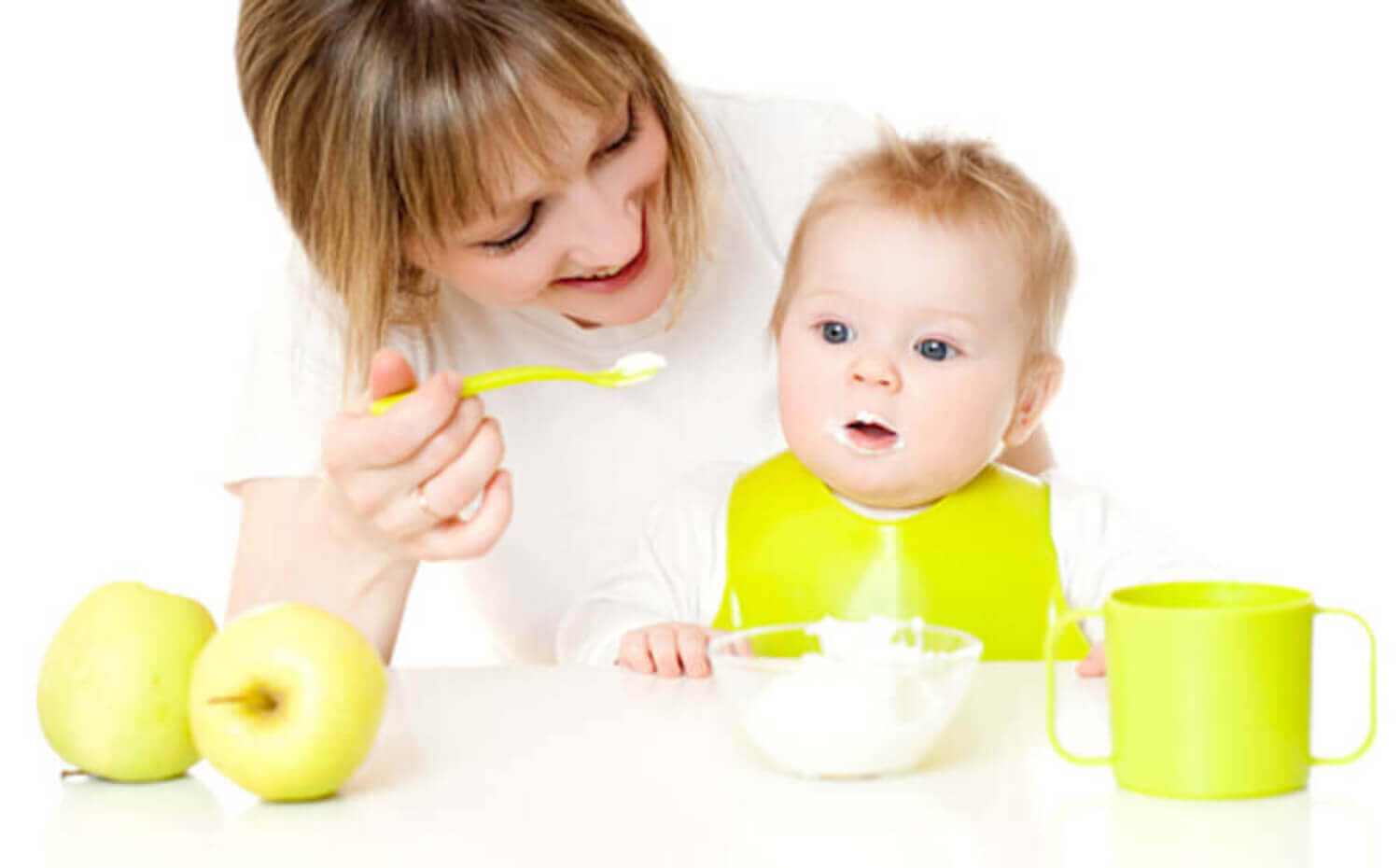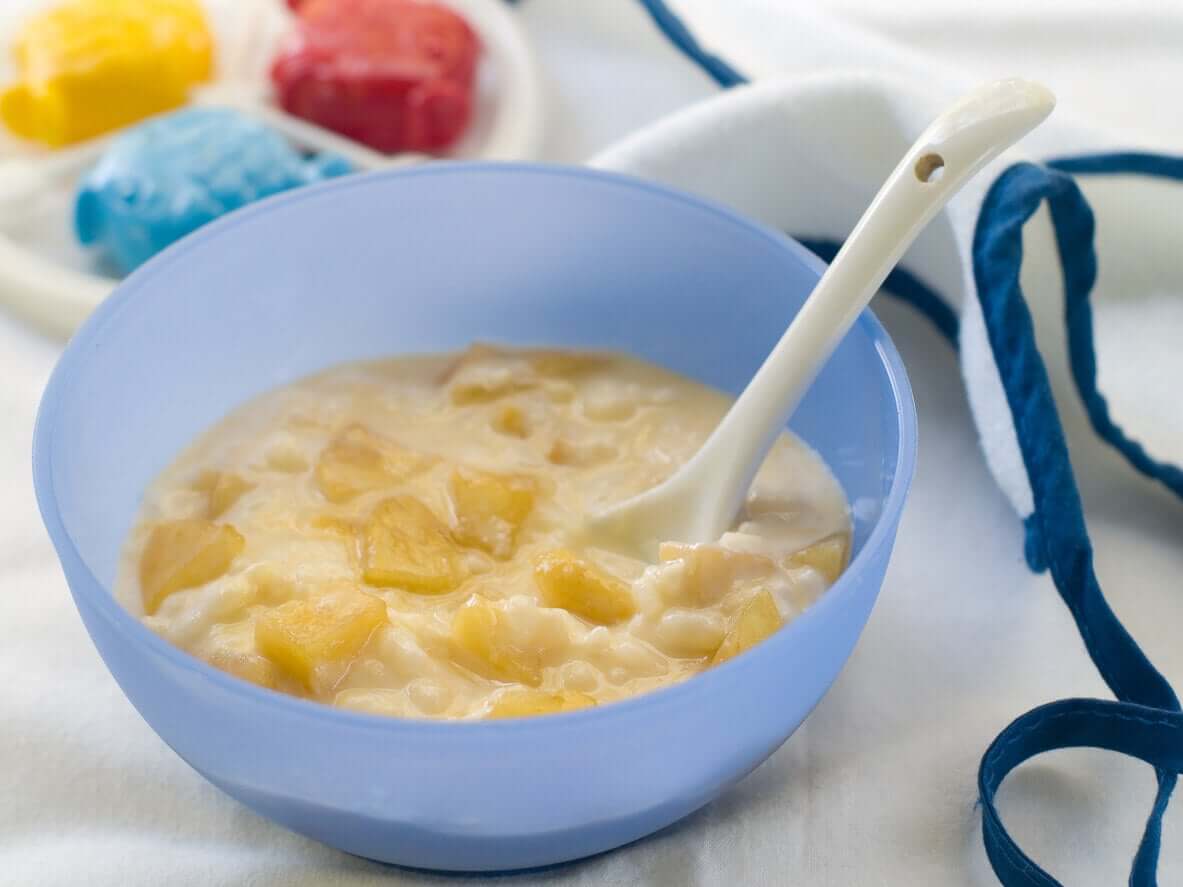Cereal Purees for Babies: What You Need to Know

Cereal purees are common preparations in the diet of babies and they manage to provide a large amount of essential nutrients, which are necessary for growth.
Now, for them to be a healthy option, it’s essential that you choose good ingredients. Above all, avoid the presence of simple sugars and other additives that affect the metabolic health of children.
The first thing to keep in mind is that simple carbohydrates can have a very negative impact on the baby’s body and predispose them to pancreatic stress and insulin resistance in the future. In addition, it’s not good for babies to get used to very sweet flavors, as this will determine their food choices when they’re older.
When to introduce cereals in a child’s diet?

To begin with, it should be noted that cereals shouldn’t be included in the baby’s diet before the sixth month of life. Until then, the best food is breast milk, and from there, complementary feeding can be safely started.
Now, you must keep in mind that cereal purees aren’t an essential part of a baby’s diet. They’re not even the only way to offer these foods. In addition, you need to avoid adding cereals to their bottles, as this favors an energy imbalance and predisposes children to excess weight.
At the same time, we need to mention that there are different types of cereals and that not all have the same quality.
The best option is usually oatmeal, as it’s made up of beta-glucans, elements that are very necessary in order to ensure digestive function. According to a study published in The Journal of Nutritional Biochemistry, these manage to stimulate the growth of the bacteria that make up the microbiota.
Beware of industrial cereal purees
It’s common to find ready-made cereal purees in stores. While they’re promoted as being natural, in many cases, they’re not entirely natural. The main reason is that they contain added sugars in high concentrations. This promotes pancreatic stress from an early age in life.
In addition, the cereals present in these porridges are usually excessively crushed, a condition that favors a rapid absorption of carbohydrates and an increase in the glycemic index. In the medium term, this translates into uncontrolled blood sugar levels and leads to insulin resistance.
The best option is always to make cereal purees at home in order to avoid additives, and combine oats with other ingredients (for example, corn or wheat flakes or rice semolina). This way, you get a food that’s full of long-chain carbohydrates, that is, of good quality.
In addition, homemade purees can be supplemented with milk (a source of fat and protein) or fruit (a source of fiber).
Is it good to include whole grains in baby food?
The best thing to do is to always include whole grains in your baby’s food, as they stand out for their high fiber concentration. This element is essential in order to achieve an efficient intestinal transit and to make sure that the microbiota becomes competent.
In addition, regular consumption of fiber in sufficient quantities is associated with a lower risk of developing chronic and complex health problems in the future. Therefore, experts also recommend increasing your intake of fruits and vegetables every day of the year.

Cereal purees are beneficial for babies
As you’ve seen, cereal purees are preparations that have several benefits for babies.
It’s good for them to appear in the diet of little ones with some regularity, as they provide children with energy and high-quality nutrients. Likewise, they serve to improve the digestive function of babies. However, they must be included in the context of a varied diet and not just limited to this option.
Finally, you should keep in mind that commercial versions of cereal purees aren’t as beneficial as they seem. Their ingredients are often too crushed and can contain high amounts of simple sugars and chemical additives. Therefore, it’s best to avoid ultra-processed ones and it’s always better to prepare them at home.
Cereal purees are common preparations in the diet of babies and they manage to provide a large amount of essential nutrients, which are necessary for growth.
Now, for them to be a healthy option, it’s essential that you choose good ingredients. Above all, avoid the presence of simple sugars and other additives that affect the metabolic health of children.
The first thing to keep in mind is that simple carbohydrates can have a very negative impact on the baby’s body and predispose them to pancreatic stress and insulin resistance in the future. In addition, it’s not good for babies to get used to very sweet flavors, as this will determine their food choices when they’re older.
When to introduce cereals in a child’s diet?

To begin with, it should be noted that cereals shouldn’t be included in the baby’s diet before the sixth month of life. Until then, the best food is breast milk, and from there, complementary feeding can be safely started.
Now, you must keep in mind that cereal purees aren’t an essential part of a baby’s diet. They’re not even the only way to offer these foods. In addition, you need to avoid adding cereals to their bottles, as this favors an energy imbalance and predisposes children to excess weight.
At the same time, we need to mention that there are different types of cereals and that not all have the same quality.
The best option is usually oatmeal, as it’s made up of beta-glucans, elements that are very necessary in order to ensure digestive function. According to a study published in The Journal of Nutritional Biochemistry, these manage to stimulate the growth of the bacteria that make up the microbiota.
Beware of industrial cereal purees
It’s common to find ready-made cereal purees in stores. While they’re promoted as being natural, in many cases, they’re not entirely natural. The main reason is that they contain added sugars in high concentrations. This promotes pancreatic stress from an early age in life.
In addition, the cereals present in these porridges are usually excessively crushed, a condition that favors a rapid absorption of carbohydrates and an increase in the glycemic index. In the medium term, this translates into uncontrolled blood sugar levels and leads to insulin resistance.
The best option is always to make cereal purees at home in order to avoid additives, and combine oats with other ingredients (for example, corn or wheat flakes or rice semolina). This way, you get a food that’s full of long-chain carbohydrates, that is, of good quality.
In addition, homemade purees can be supplemented with milk (a source of fat and protein) or fruit (a source of fiber).
Is it good to include whole grains in baby food?
The best thing to do is to always include whole grains in your baby’s food, as they stand out for their high fiber concentration. This element is essential in order to achieve an efficient intestinal transit and to make sure that the microbiota becomes competent.
In addition, regular consumption of fiber in sufficient quantities is associated with a lower risk of developing chronic and complex health problems in the future. Therefore, experts also recommend increasing your intake of fruits and vegetables every day of the year.

Cereal purees are beneficial for babies
As you’ve seen, cereal purees are preparations that have several benefits for babies.
It’s good for them to appear in the diet of little ones with some regularity, as they provide children with energy and high-quality nutrients. Likewise, they serve to improve the digestive function of babies. However, they must be included in the context of a varied diet and not just limited to this option.
Finally, you should keep in mind that commercial versions of cereal purees aren’t as beneficial as they seem. Their ingredients are often too crushed and can contain high amounts of simple sugars and chemical additives. Therefore, it’s best to avoid ultra-processed ones and it’s always better to prepare them at home.
All cited sources were thoroughly reviewed by our team to ensure their quality, reliability, currency, and validity. The bibliography of this article was considered reliable and of academic or scientific accuracy.
- Krol, K. M., & Grossmann, T. (2018). Psychological effects of breastfeeding on children and mothers. Psychologische Effekte des Stillens auf Kinder und Mütter. Bundesgesundheitsblatt, Gesundheitsforschung, Gesundheitsschutz, 61(8), 977–985. Disponible en: https://doi.org/10.1007/s00103-018-2769-0
- Jayachandran, M., Chen, J., Chung, S., & Xu, B. (2018). A critical review on the impacts of β-glucans on gut microbiota and human health. The Journal of nutritional biochemistry, 61, 101–110. Disponible en: https://doi.org/10.1016/j.jnutbio.2018.06.010
This text is provided for informational purposes only and does not replace consultation with a professional. If in doubt, consult your specialist.








